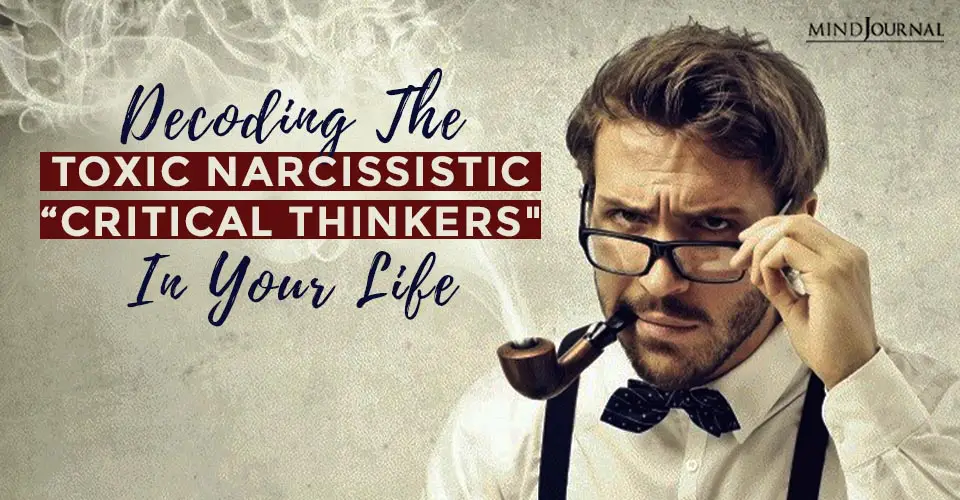Do you have one of those narcissistic critical thinkers in your life, who is always finding faults in you, and make you feel horrible about yourself?
I hear from lots of commenters who pride themselves on their critical thinking. They’re into facts. They’re into reality. All of the fools who oppose them are unrealistic and deluded.
I think of them as corrupt fallacy police. They are quick on the draw when policing other people for failing to live up to the exacting standards of critical thinking but they won’t tolerate any criticism of their beliefs.
If you point out a fallacy in their thinking, they ignore or dismiss it—or better yet, cite you for another failing. They’ll dish out critical thinking but don’t you ever dare make them apply it to their beliefs. If you try, they’ll throw the book at you, a bunch of memorized cliche talking points.
They’ll insist on umpiring all debates they enter. They know the crux of the issue. It’s whatever they insist it is, whatever they think trumps all other concerns. If you won’t follow them to what they think is fundamental, you’re deluded because after all, they’re critical thinkers!
For example, I often hear from people who say in so many words, “You used the ad hominem fallacy, therefore you’re wrong about everything,” not noticing that they’re indulging in an ad hominem argument.
There’s a Subreddit called Selfawarewolves that collects examples of such proudly, blindly, blatant hypocrisy. I would have called that Reddit “Self-awary.”
It’s natural to be wary of self-awareness. Self-awareness breeds self-consciousness, second-guessing, and doubt. That stuff is wonderful so long as other people do it. Your opponents should do it but you shouldn’t have to. It’s liberating to ignore your own critical thinking failures and you can if you focus on other people’s. Blare your police siren loud and you don’t have to hear yourself thinking.
Related: Daughters of Narcissistic Mothers: Why They Are Never Good Enough
I love critical thinking. Socrates is commonly regarded as its founder, a leader in doubt and questioning. Ironically, he’s also regarded as the founder of its opposite, the quest for absolute truth beyond all doubt and questioning. I embrace both goals but don’t believe they’re reachable. Since Socrates, we come to realize that we can’t doubt what we don’t know we assume and that there are no absolute truths immune to all doubt and questioning.

I embrace Socrates most for his trouble with sophists, people who use critical thinking (logic, or logos) only to bash other people’s views, in other words, exploiting critical thinking as a gaslighter, narcissist, total arse’s arsenal.
Sophistry is a pandemic these days. The world has gotten overwhelmingly complicated. It’s not comfortable to be self-aware and doubtful in our current sandstorm of doubt-generating possibilities. People are therefore naturally drawn to anything that makes them feel self-certain as though they’ve found the absolute truth beyond all doubt (here’s a short video about it). Declaring yourself a critical thinker comes in very handy that way.
You can simply proclaim yourself a critical thinker without ever having any training in it or giving any thought to what the term means. Just ornament yourself in the critical thinking badge of authority because that’s what the cool kids are wearing. You’re a critical thinker because you say so. Just as someone posturing as a know-it-all doesn’t have to know much, someone posturing as a critical thinker doesn’t have to critical think much.
In order to wear that badge proudly, it helps if you don’t critical-think your own beliefs. I call it “exempt by contempt.” You have such contempt for uncritical thinkers that you must be an expert on uncritical thinking and therefore exempt from it. “Moi! Uncritical?! Impossible! I hate uncritical thinking!”
That’s like playing the constant victim of unfairness, assuming that you’re an expert on unfairness and therefore exempting yourself from ever being accused of unfairness. “I’m fair-minded because I can always tell when someone is being unfair to me!”
Or you can proclaim yourself a critical thinker because you follow a leader who proclaims that they are. We find an example of this in the followers of Ayn Rand, who titled her philosophy “objectivist,” as though she had access to some privileged access to objective truth. To this day, her pulp cartoonish novels about objectivist heroes have readers and even leaders swooning all over themselves, identifying with the heroes, declaring themselves objective, and posturing as the fallacy police.
Often people will fall for leaders who simply style themselves as critical thinkers, employing like the pied piper the rhetorical music of critical thinking, the upright posture, the parental scolding voice, the flattering clothing, without employing any real critical thinking other than to trounce all challenges to their uncritical self-certainty.
Related: The Ten Narcissistic Commandments
Or you can take a course in critical thinking and get excited about it for the power it affords you to play fallibility police, armed to defend your gut-assumptions. Declare yourself an expert on critical thinking and take on the world!
The general pattern goes like this:
First, your ears prick up at some leader who postures as the most critical thinker around, a person who lends dignity to your intuitions.
You’re riveted by the budding romance between your intuitions and this rational sounding leader. You fall in love.
You marry. You follow this leader’s ideas and through them, find like-thinkers also singing in the voice you aspire too, the ideas you intuit, and a style you revere.
You study more avidly than you’ve ever studied. You weren’t a great student before but now your mind is abuzz with everything self-affirming you’re learning. You parrot these leaders’ styles. You memorize these leaders’ talking points. You notice that you’ve got a tribe of people agreeing with you so you must be right after all.
What a relief! You’re like the undiscovered genius, like the pauper who discovers he was actually a prince all along or the ugly duckling who proved to be the magnificent swan!
You watch your fellow tribe members in action doing battle against the fools out there who lack your critical thinking skills. You watch your opponents fall in these battles. You copy them. You’re impressed by how effective you are at defeating people with your new combo of the gut, “critical thinking,” and memorized talking points. You insist on shifting all conversation and debates to your comfort zone, the places where you can trounce people with your parroted talking points.
People walk away in frustration, an indication of victory for your intuitions, rationality, and talking points. With every triumph with your newfound powers, you become more convinced that your opponents are fools.
Never in your life have you felt more engaged in the world; more on top of it, too.
Too many people learn a dangerous thimbleful of critical thinking without ever applying it to their own beliefs. There are ways to teach critical thinking that don’t have this awful effect. I lay them out in this article but here they are in brief:
Critical thinking is largely the ability to recognize fallacies, weak arguments for a claim, in other words, the ability to unspin spin, the empty or thin rhetorical arguments to support some claim. The claims may be right or wrong. Think of fallacies as “undicators” indications that don’t indicate one way or another about the claims.
Fallacies come in opposing pairs: For example, it’s a fallacy to say that a claim must be right because lots of people believe it. It’s also a fallacy to say that you claim must be right because you’re a brave lone maverick who believes it against all odds. Likewise, wishful thinking is a fallacy but so is “dreadful thinking” the assumption that a claim must be right because people don’t want to hear it.
Every fallacy is also a rhetorical device. In other words, if you know how to unspin an argument, you also know how to spin it. Social psychology is providing some of the most advanced work today on spinning and unspinning arguments. It’s inventorying the varieties of human vulnerabilities to persuasion. The most fundamental is confirmation bias. Spinning what you want to believe, unspinning what you don’t.
Related: 10 Interesting Facts That Will Help You Understand Narcissists Better
Responsible critical thinking can be taught by emphasizing ways to counter and thereby neutralize confirmation bias. In other words, making students unspin their own claims and spin their rival’s claims. Teach students to apply critical thinking to their claims and to make persuasive rhetorical arguments in support of their rivals.
And here’s a four-minute video on the robotic abuse of “critical thinking” rhetoric.
Written By Jeremy Sherman
Originally Appeared In Psychology Today
Having one of these toxic narcissistic critical thinkers in your life is similar to having a cactus attached to your body at all times; it will always hurt you. No matter what you do, they will always find a way to put you down and make you feel horrible about yourself. Narcissistic critical thinkers pride themselves on the fact that they are blunt, and say it as is, without considering how mean, and toxic they are being to others. If you have someone like this in your life, shut them down the moment they start to display their toxicity, and never stand down, no matter what.









Leave a Reply
You must be logged in to post a comment.